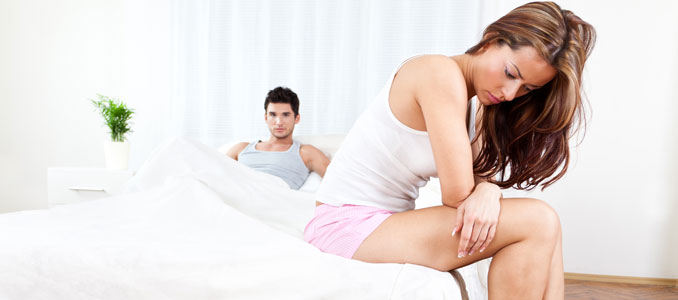Low Sex Drive in Women
It is often said to be a cruel twist of fate that women hit their sexual peak at 35 when males hit it at 17 – but, that is not true. More adults in their 50s and 60s are reporting that their 40s were the time of peak sexual pleasure. While this applies to a lot of people, it is not the case for everyone – especially those men and women dealing with hormonal imbalance.
In this report, we will look at low sex drive in women: the causes, the symptoms, and the treatment. This condition is often termed FSAD – Female Sexual Arousal Disorder. Yes, it has its own name. The causes, however, can run the gamut from emotional stress to physiological changes.
What may be surprising to many women is that low sex drive has nothing at all to do with orgasms. In fact, many females who have no desire for sex still report that when they do engage in intercourse, they still have powerful orgasms – it is just that they have little thought even to get started. Why is that if sex is still pleasurable when it occurs?
For one thing, there is a brain-body connection that occurs – or does not occur – in regards to sexual desire. The brain has to send signals to the body to initiate feelings of arousal.
There are many reasons why these signals do not arrive, including:
- Fatigue
- Overwork
- Stress or anxiety
- Too much on the mind
- Illness
- Hormonal deficiency or imbalance (may result from post-pregnancy or menopause, as well)
- Depression
- Relationship discord or problems
- Substance abuse – alcohol or drugs
- Anemia
- Some medications, including tranquilizers
- Hyperprolactinaemia – rare disorder resulting in an overactive pituitary gland
- Prior sexual abuse
- Possible changes in sexual orientation
These are the most common reasons why sex drive declines in women. It is difficult to feel amorous when you wake up early to get the children off to school, work all day at a job, check in on aging parents after work, cook dinner, run the kiddies to extracurricular activities, deal with chores and homework, and everything else that comes along during the course of any given day. Stress and outside influences certainly exist, but it is often what is going on inside the body that is to blame.
You see, women are especially susceptible to hormonal fluctuations throughout life. They occur monthly during the natural menstrual cycle, change considerably during and after pregnancy, and then undergo another upheaval during menopause. Not all hormones affect sexual desire, but the ones that do can really put a damper on arousal. Growth hormone levels start to decline during the early thirties. This may be the cause of low sex drive in younger women. Testosterone is often associated with female sex drive, and its levels drop significantly during menopause when the ovaries stop working.
What Are the Symptoms of Low Sex Drive?
The symptoms of low sex drive are easy to see: you no longer have much of an interest in initiating or having sex. It may take longer to feel aroused. For some females, vaginal dryness makes sex uncomfortable, so the brain naturally turns off feelings of sexual desire as a way to avoid painful intercourse. Hot flashes and night sweats often accompany menopause, so since low sex drive during this time is common, many women link these symptoms together. It is hard to feel amorous when you are always breaking out in hot flashes or waking up in a pool of sweat every night.
Diagnosing low sex drive is easy – you just never seem to be in the mood.
Diagnosing the cause of low sex drive is a bit harder. Take another look at the list in the previous section. Does anything stand out to you as a definitive cause? If you are having problems on the job, then work issues can certainly be the problem. If you have recently given birth, your hormone levels could be out of balance. You may also be tired from caring for a newborn, and some women just don’t want to be touched by the end of the day because they have had physical contact with their children all day and just want to be left alone.
If you are not sure of the cause, it may be wise to contact a hormone replacement therapy specialist to ask to have your hormone levels checked. If the problem is hormonal, the right treatment could have you feeling amorous again in just a short while.
Treatment Options for Low Sex Drive in Women
To date, there is no “magic pill” that can reignite the flames of desire in women. The best option is to get to the root of the problem and correct that for improved sexual desire. Obviously, if relationship issues are present, couples counseling may be the best option. If you are tired, going to sleep earlier at night (leave the chores for the weekend) can help provide you with more energy. Too many women try to be “Wonder Woman” and face feelings of failure when they do not seem to get it all done. Stop trying to be “Superwoman” and accept that you are “Super You” no matter what does or does not get done. You are just right the way you are.
Now, in terms of medications, any female dealing with low testosterone levels (especially when resulting from menopause) will find that testosterone replacement therapy in the form of a compounded cream will work wonders for stimulating sexual desire.
Here are some other options for treating low sex drive in women:
- DHEA – this supplement has helped some postmenopausal women improve their sex drive
- Yoga – may help increase desire and arousal after 12 weeks of regular yoga sessions
- Mediterranean Diet – lower sexual dysfunction was reported in women with type 2 diabetes who adhered to this diet
- Acupuncture – a study on women taking antidepressants found that after 12 consecutive weeks of acupuncture they had improved libido and lubrication
- Mindfulness Meditation – after four 90-minute mindfulness meditation therapy sessions, women reported six months later that they had significantly improved sexual desire
Obviously, the best treatment is going to be the one that works for your specific needs. If there is a chance that the reason for low sex drive is hormonal, contacting a hormone specialist may offer you the best way to improve your sex life.
- Sex Hormones Determine Immune Response Veena Taneja Published online 2018
- Sex hormones influence on the immune system: basic and clinical aspects in autoimmunity. Cutolo M, Sulli A, Capellino S, Villaggio B, Montagna P, Seriolo B, Straub RH.Lupus. 2004;13(9):635-8.
- Hormonal influence on the secretory immune system of the eye: Endocrine impact on the lacrimal gland accumulation and secretion of IgA and IgG David A. Sullivan Louane E. Hann Volume 34, Issues 1–6, 1989, Pages 253-262




